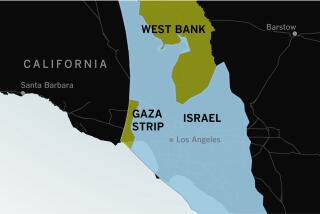Portland, FBI Unit to Part Ways
This city is expected today to become the first in the nation to pull out of an FBI Joint Terrorism Task Force, following a series of disagreements between Portland leaders and federal investigators.
Mayor Tom Potter and several city commissioners, frustrated by the FBI’s refusal to grant them full access to classified information, say the withdrawal will signal Portland’s commitment to the protection of individual civil rights.
High-profile cases such as the detention of Muslim lawyer Brandon Mayfield, who was wrongfully arrested last year as a suspect in the Madrid train bombings, prompted city leaders to request more oversight of Portland officers involved in the group.
The move, predicted to pass by a 4-1 vote of the City Council, would make official what has been anticipated for months at City Hall. Some fear the decision might encourage other cities to follow suit.
“I hope other cities do start asking questions,” said Randy Leonard, a Portland city commissioner and chief backer of the withdrawal. “It’s important for cities to know how their police officers are being used. Here in Portland, we are not willing to give up individual liberties in order to have a perception of safety.”
The FBI heads 100 of the task forces across the country -- teams made up of federal, state and local law enforcement agents working together to prevent terrorist attacks. The task force in Portland, formed in 1997, was responsible for the convictions last year of six local residents who conspired against U.S. troops in Afghanistan. The two city police officers who have served as part of the team will be reassigned.
Critics say Portland’s withdrawal could make the region more vulnerable to terrorist attack.
“Portland is a hub city,” said Rob Drake, mayor of neighboring Beaverton. “If you take Portland out, it’s basically a hole in the doughnut, and that hole could represent a gap in communication and intelligence.”
“The primary lesson of 9/11 was that we need greater coordination, greater sharing of information between federal and state and local agencies,” said John R. Kroger, an assistant U.S. attorney in New York at the time of the terrorist attacks. Kroger teaches criminal law at Lewis & Clark University law school here.
“The decision to pull Portland out takes us in the opposite direction,” Kroger said. “We’re not tearing down the walls [between government agencies]. We’re building them back even higher.”
Kroger criticized the FBI’s handling of the Mayfield case, but the answer for Portland wasn’t “to pick up your marbles and go home.”
Mayfield, a Portland-area lawyer and convert to Islam, was linked -- via a single fingerprint -- to the terrorist bombings that killed 191 people in Spain last year. He spent two weeks in detention before Spanish authorities informed the FBI that the incriminating print did not belong to him. The FBI called it a technical error and cleared the lawyer, who is suing the federal government.
Mayfield has said the FBI conducted illegal “sneak and peek” searches, in which agents broke into his house and gathered information without the proper authority.
“Why is the FBI so afraid of oversight?” Mayfield’s lawyer, Gerry Spence, said in a phone interview from Santa Barbara. “If what they’re doing is legal and proper, why should they be afraid of the mayor wanting to know what’s going on in his city?”
The main dispute behind Portland’s expected withdrawal from the task force is one of oversight.
Mayor Potter, a former Portland police chief, earlier this year requested that the federal government grant him, the police chief and the city attorney top-secret security clearance -- the same as task force officers -- so that city leaders could have access to case files and more frequent updates. Potter said he wanted the ability to monitor investigative activities involving the city’s officers in order to make sure they obeyed state laws barring them from monitoring people solely because of their religious or political beliefs.
After weeks of meetings with Robert Jordan, the FBI special agent in charge in Portland, the two agreed to disagree. The FBI denied Potter’s request.
On Friday, Potter and Jordan announced Portland’s imminent withdrawal from the task force; both emphasized that ties between Portland and the FBI would not be severed but simply “changed.”
In a follow-up interview, Potter dismissed as “hogwash” the notion that the withdrawal would make the city more vulnerable to terrorists.
He said that with thousands of law enforcement personnel nationwide working the Homeland Security beat -- in addition to FBI agents watching out for terrorists -- the removal of two local officers from a single task force would not make much difference.
“If something bad happens in Portland, it’s because [terrorists] were able to slip through international, national, state and local safeguards,” Potter said. He pointed out that a Joint Terrorism Task Force was in place in New York on Sept. 11, 2001.
“I have four children and 14 grandchildren who live in the Portland area,” Potter said, explaining that he would never do anything to jeopardize their safety or the safety of the 1.5 million people who live in the greater Portland area.
The FBI would not comment on the city’s planned withdrawal, but Jordan made his thoughts clear in a statement to the City Council on March 23.
The move, he said, could damage the task force’s “ability to protect all the citizens of Oregon.” He said the decision would “run counter to reason, run counter to the recommendations as put forth in the 9/11 commission report, and run counter to the council’s own actions with regard to Homeland Security funds.”
“These [Portland] officers provide a critical communications and operational link to the largest police force in the state.”
Portland’s decision would not be the first time the city has taken a contrary stand in the war on terrorism.
In the months after Sept. 11, city leaders refused to cooperate with federal efforts to interview thousands of local Muslims. In 2003, the City Council criticized and called for radical changes in the USA Patriot Act, the much-debated federal anti-terrorism legislation.
This year, Portland was chosen to hold a major Department of Homeland Security drill in 2007. Potter praised the decision, but added that Portland would not foot the bill.
More to Read
Start your day right
Sign up for Essential California for news, features and recommendations from the L.A. Times and beyond in your inbox six days a week.
You may occasionally receive promotional content from the Los Angeles Times.






